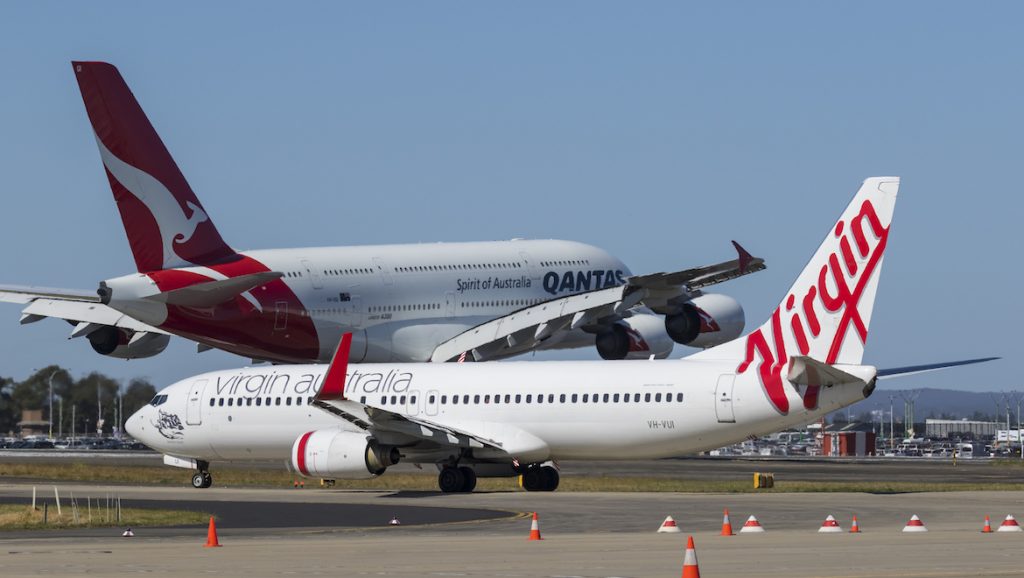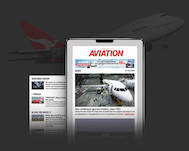
Virgin Australia has unveiled its newest Business Flyer program, which offers a competitive alternative to Qantas, again upping the ante in the post-pandemic domestic aviation battle.
With no minimum spend to sign-on and start earning points, it marks a significant deviation from Virgin’s previous “Business Accelerate” program, and places it more on-par with Qantas’ recently-overhauled Business Rewards program.
Offering up to 6 per cent off business class seats for Business Flyer program participants, it matches Qantas’ entry-level Business Rewards service, and comes right off the back of Virgin lowering its cheapest business class fares to just $299 one-way.
While, unlike Qantas, it doesn’t offer steeper discounts to its most frequent of flyers, Virgin does have its rival beat by not requiring any sign-on or ongoing membership fees, and annual lounge memberships for just $379 – as opposed to Qantas’ $89 sign-on fee and $400 annual lounge membership + $99 lounge sign-up fee.
Qantas currently offers business customers a vast number of ways to earn Business Reward points, through on-ground partners such as credit card providers, while Virgin Business Flyers can only earn points through flying.
However, Virgin CEO Jayne Hrdlicka told The Australian that this fact could change in the near future.
“We won’t lay out the rest of the strategy (today), but we intend to continue to innovate for our small and medium business community who we have spent a lot of time with, understanding what matters most to them,” Hrdlicka said.
“Today is the beginning of a journey.”
It comes as the latest in a long line of tit-for-tat moves between domestic rivals Virgin and Qantas to win over Australian businesses and frequent flyers.
In the last 18 months, Qantas has made numerous attempts to woo over both Virgin and Air New Zealand frequent flyers, by allowing top-tier members to be fast-tracked into its own loyalty scheme.
The offer was quickly matched, and beat, by the then newly-reborn Virgin, which allowed Qantas Gold members to easily swap to Gold status under its Velocity frequent flyer program, by simply booking one flight.
Qantas later came out to suggest that 25 corporate accounts took up its offer to swap loyalty programs.
After a second poaching attempt was made by Qantas in April this year, Virgin retaliated by offering triple Velocity points on all domestic airline bookings for a fortnight.
Frequent flyer programs aren’t the only space heating up with competition, as the domestic capacity war rambles on.
The Qantas Group has long-predicted that it would retain 70 per cent share of Australia’s domestic flight market after Virgin Australia exited administration in November 2020, as a leaner, mid-market competitor.
However, after an initial slip that saw Virgin’s share fall to 24 per cent, leaving the Qantas Group with 74 per cent share in December 2020, Virgin quickly snapped back up to over 30 per cent by October 2021.
Then, last month, Australian Aviation reported that Virgin’s share of the domestic market jumped again to 34 per cent, meaning that it had beaten out both Qantas and Jetstar (individually) in January 2022.
The figure surpassed Virgin’s long-held target since exiting administration in November 2020 to achieve and hold onto 33 per cent of domestic market share. Virgin boasted just 22 per cent share in November 2020.
Qantas and Jetstar each claimed 31 per cent of the month’s domestic passenger market share in December, sending the Qantas Group’s collective share to just 62 per cent.
Meanwhile, new competitors in the domestic aviation market are also making waves.
According to the Australian Competition and Consumer Commission chair Rod Sims, the addition of Rex into the domestic airline market has driven down prices for consumers, and driven competition between incumbent players.
“The Australian domestic airline industry has predominantly been a duopoly since deregulation 30 years ago, but we now have three airline groups competing on some of Australia’s busiest routes,” Sims said.
“We’ve seen significant price reductions on these routes due to increased competition,” he said.
“Each airline is working hard to win over consumers and as they continue fighting for market share, we can expect competitive airfares, improved connectivity, and better products and services.”
Overall, domestic carriers saw 2.5 million passengers in January 2022, a decrease of around 50 per cent compared to pre-COVID levels.
The ACCC also noted the announcement of start-up budget carrier Bonza’s initial route offering, and again reiterated its commitment to ensuring new entrants are allowed to thrive.
“We will be watching how the existing airlines respond to this new competition, and we will keep an eye out for any anti-competitive capacity increases or pricing practices,” Sims said.
“We will pay particularly close attention to incumbent airlines entering any of the new routes announced by Bonza.”
Notably, Bonza’s initial route network does not fly to or from Sydney, despite the carrier’s attempts to come to an arrangement with the airport.
“We understand that Sydney Airport’s proposal did not meet Bonza’s requirements, and access to take-off and landing slots presented a further impediment to entry,” Sims said.
“Policy settings need to be improved to create a more fertile environment for new and expanding airlines, and we note that the government is currently reviewing its rules for how slots at Sydney Airport are allocated to airlines.”
“The arrangements whereby airlines can retain historic precedence to slots must not be used to protect incumbent airlines from competition,” Sims said.
















